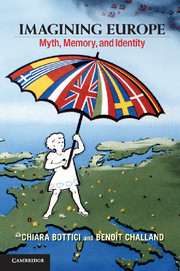4 - Myths of Europe
Published online by Cambridge University Press: 05 July 2013
Summary
As the previous chapters have shown, many scholars emphasize the symbolic and emotional deficit inherent in the construction of Europe. European citizens do not feel attached to European institutions, which are often perceived as part of a gray, Brussels bureaucracy. For some, this is the inevitable result of a process of political integration, understood as the spillover effect of economic imperatives; for others, it is the consequence of the abandonment of a truly federalist project in the early 1970s. Subsequently, the EU became a “regulatory state” (Majone 1996), a “performance-based” polity, which can (and should) rest on a merely output-oriented legitimacy (Scharpf 1999). According to some of the positions analyzed in Chapter 1, the European project could, therefore, be considered legitimate simply because it contributes to the well-being of its citizens; thus, it does not require any further symbolic underpinning or any common identity resembling those that support most national identities.
By contrast, others vindicate the need for a strong political and/or cultural identity to sustain the European project. In this view, Europe cannot build its legitimacy without relying on some form of identification on the part of its citizens in a series of common symbols, myths, and values (Henry 2001; Passerini 2003). If Europe is to be more than an economic and bureaucratic project, it must search for a common European identity. In this light, Europe needs its soul, and this soul can rise only from the common European cultural and historical heritage (Rudolph 2001).
- Type
- Chapter
- Information
- Imagining EuropeMyth, Memory, and Identity, pp. 87 - 112Publisher: Cambridge University PressPrint publication year: 2013



